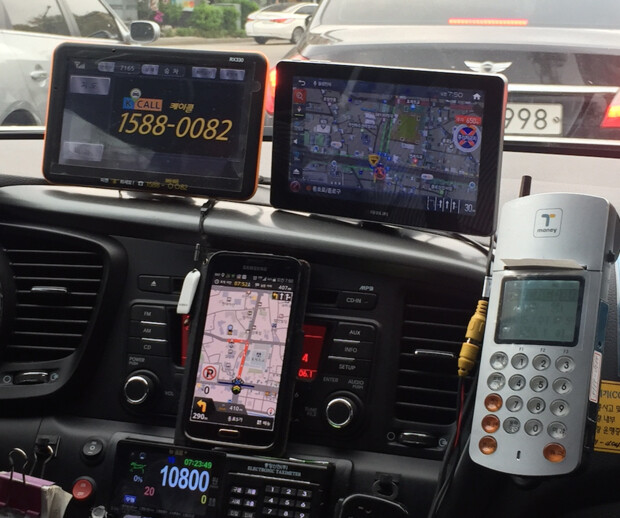
Daejeon Metropolitan City has demonstrated its commitment to prudent fiscal management by successfully negotiating a reduction in taxi card transaction fees, a move projected to save taxpayers approximately KRW 200 million in the current year alone. This strategic initiative underscores the city's dedication to optimizing public spending and enhancing the efficiency of its transportation services.
The landmark agreement, formalized on April 9th through written amendments to the ‘Taxi Fare Card Payment Business Agreement’ with prominent transportation network companies T-money and Enjoy Mobility, marks a significant achievement in the city's ongoing efforts to streamline operational costs within the taxi industry. The revised terms specifically target the commission rates applied to credit card transactions, which are currently fully subsidized by the Daejeon municipal budget.
Under the newly negotiated rates, scheduled to take effect for all card payments processed on or after February 14, 2025, a discernible decrease in commission percentages will be implemented. Corporate taxi operators will see their average credit card commission rate reduced from 1.59% to 1.54%, representing a 0.05 percentage point decrease. Individual taxi operators will benefit from a more substantial reduction, with their commission rate falling from 1.2% to 1.1%, a 0.1 percentage point decrease.
Considering the robust annual revenue generated by Daejeon's taxi sector, estimated at KRW 330 billion in 2024, the cumulative impact of these seemingly small percentage reductions translates into substantial financial savings. Notably, individual taxis constitute the majority of this revenue. Applying the 0.1% reduction to the estimated KRW 165 billion in revenue generated by individual taxis alone yields a minimum annual saving of KRW 165 million in transaction fees. The 0.05% reduction for corporate taxis, also based on approximately KRW 165 billion in revenue, is expected to contribute an additional KRW 82.5 million in annual savings. Consequently, the aggregate annual cost reduction for the entire Daejeon taxi industry is projected to reach approximately KRW 200 million.
Daejeon City's history of subsidizing taxi card payment fees dates back to 2010. The initial implementation focused on alleviating merchant resistance to card payments for smaller fares, specifically covering fees for transactions under KRW 5,000. This measure aimed to encourage broader adoption of electronic payment methods and enhance convenience for passengers.
However, in 2012, recognizing the economic challenges faced by the taxi industry, the city expanded its financial support to encompass the entirety of card transaction fees. While this blanket subsidy provided immediate financial relief to taxi operators, it inadvertently fostered a reliance on public funds and potentially diminished incentives for the industry to actively seek cost efficiencies and explore alternative fee structures.
In a proactive move to address these unintended consequences and promote greater fiscal responsibility within the taxi sector, Daejeon City launched the ‘Taxi Industry Innovation Plan’ in March of the preceding year. A key component of this comprehensive plan involved a thorough review and restructuring of the card fee subsidy program. This initiative included engaging in sustained and rigorous negotiations with the primary transportation network companies operating in the region, T-money and Enjoy Mobility, as well as relevant card processing companies. These negotiations ultimately culminated in the successful agreement to lower the prevailing commission rates.
Furthermore, the city strategically addressed a critical aspect of the previous agreement by eliminating the automatic renewal clause. This pivotal change ensures that the commission rates will be subject to annual renegotiation, providing Daejeon City with greater leverage to secure more favorable terms in the future and adapt the subsidy program to evolving market conditions and technological advancements in payment processing. This dynamic approach will foster a more transparent and accountable system for managing public funds allocated to support the taxi industry.
Nam Si-deok, the Director of Daejeon Metropolitan City's Transportation Bureau, emphasized the broader significance of this achievement, stating, "The successful reduction of taxi card commission rates transcends mere budgetary savings. It signifies a fundamental step towards enhancing the rationality, transparency, and long-term sustainability of our public financial management practices. By ensuring that taxpayer money is utilized with maximum efficiency, we are reinforcing our commitment to responsible governance and the optimal allocation of resources."
Director Nam further affirmed the city's ongoing commitment to the taxi industry and the commuting public, adding, "Daejeon City will maintain a proactive stance in engaging with transportation operators and card companies. Our objective remains to mitigate the financial burdens faced by the taxi industry while simultaneously safeguarding the interests of our citizens by ensuring that their valuable tax contributions are deployed in the most effective and judicious manner possible. We are committed to fostering a healthy and sustainable transportation ecosystem for the benefit of all residents."
This strategic fiscal maneuver by Daejeon City serves as a commendable example of how local governments can proactively manage expenses and optimize public resources, ultimately benefiting both the service providers and the citizens they serve. The anticipated savings of KRW 200 million annually represent a tangible return on the city's diligent efforts and a positive step towards ensuring the long-term financial health of its transportation sector.
[Copyright (c) Global Economic Times. All Rights Reserved.]



























